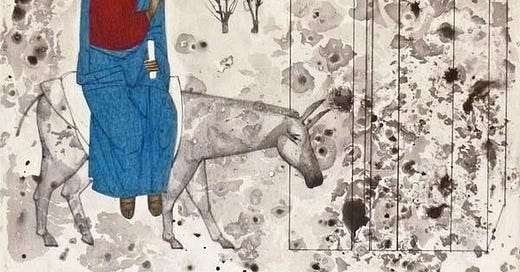There were two processions on Palm Sunday, not just one. These processions move in different directions: one towards domination, another towards liberation. And in a time of MAGA, they call for a decision in the here & now, one that confronts us not in the abstract, but in the concrete.
This confrontation becomes clear the more we pay attention to the texture and reality of Palm Sunday in the New Testament. There, in the first century CE, Rome occupied the province of Judea, the land and backdrop to Jesus’ ministry.
And Jesus’ teaching was not blind to the reality of Roman occupation. His moral imagination taught a “going the second mile” in the event a Jew was forced to carry a Roman solder’s pack. He acknowledged the daily reality of interaction with Roman occupiers while subverting it. Jesus’ Kingdom provoked a human encounter, one which forced oppressed and oppressor to recognize their shared humanity.
We might say it was a soft occupation. Rome ruled through a combination of proxy rulers (like Herod), administrative oversight (like taxation with Levi and Zaccheaus) with the occasional deterrent of hard power: Pontius Pilate. In 70 CE, this hard power would destroy the Jewish temple and fund the Roman construction of the Colosseum.
All of these tensions and friction gives more texture to Palm Sunday. Thousands of pilgrims ascended to Jerusalem as worshipers whose expectations were political, material, and concrete.
Just 150 years earlier (like we think about the American Civil War) the Maccabees in Judea revolted against another occupying empire—the Seleucids. In the wake of their revolution, palm branches became a symbol of this victory. The image was even minted on coins!
Nearly two centuries later, now under the foot of Rome, people reached for palm branches not as a show of overtly spiritual/abstract salvation. They welcomed Jesus as a messiah in the mold of the Maccabeans. They were signaling a certain sort of hope: a revolutionary expectation of liberation from Roman oppression.
In our terms, we might say the Romans saw the mass pilgrimage of Jewish people to Jerusalem for Pesach (passover) as a security threat.
Every year as Pesach approached, Pilate, the Roman governor, would stage a mini triumph—a Roman military parade—and enter Jerusalem on a war horse. They projected hard Roman power, entering as security forces to deescalate and stay off any nationalist/insurrectionary dissent. It was a tense situation, with historical pressure.
Jesus’ entry to Jerusalem was certainly staged. He gave instructions to find a colt, and—once the counter-procession began—welcomed shouts of “Hosanna!” or “save us now!”, cries charged with revolutionary expectation.
The politically astute who saw the procession knew this would invite the attention of Rome and provoke its claim to power. They begged Jesus to disown the crowds and ask them to be silent. Jesus’ response is telling: “if they were silent, the rocks would cry out!” A far cry from the hush hush of evangelical churches who say, “we don’t talk politics here.”
Staging this counter-procession on what has become known in the Christian tradition as “Palm Sunday” is not a neat and tidy Sunday School story. Nor is Jesus’ clearing of the temple later in the week.
This actions not only drew the attention of Rome and those who sympathized with its power, it revealed the nature of his Kingdom in direct defiance of Roman claims to security and power. The site of this revelation though was scandalous: the Roman cross itself.
By the end of the week, his life would end like most messianic hopefuls under the foot of Rome: hanging on a Roman cross. The revolutionary hopes of the people—trusting in a political messiah leading a violent overthrow of Rome—would have seemed dashed, if it weren’t for the empty tomb.
Palm Sunday makes plain the choice we face, again and always: the way of empire or the way of the Crucified One.
The temptation of empire, of security through violence and domination, is renewed in every generation. MAGA is this temptation in our day.
But in the face of this temptation to security and domination, to greed and supremacy, the revolutionary expectations of the oppressed are, mysteriously and subversively, not silenced by the Cross, but rather given a new path of hope, a new liberation and expression, a way of peace.
But to take this path means recognizing we cannot obey “Take up your Cross” and “Make America Great Again” at the same time. This risen Word confronts and empties all rogue words of their power in the here & now.
Editor’s Note: For more on this reading of the Triumphal Entry, read “The Last Week: What the Gospels Really Teach About Jesus’ Final Week in Jerusalem” by New Testament scholars John Dominic Crossan and Marcus Borg. Their work was cited in an author comment, but it is better to include it here too in the actual piece.





Awesome! I did not know about the Imperial parade so close to Passover. It makes this whole incident so much more meaningful. Thank you, and blessings.
Hi Jared - I reread this sentence a few times before figuring it out. I think the word "say" should be "saw". Is that correct?
The politically astute who say the procession knew this would invite the attention of Rome.